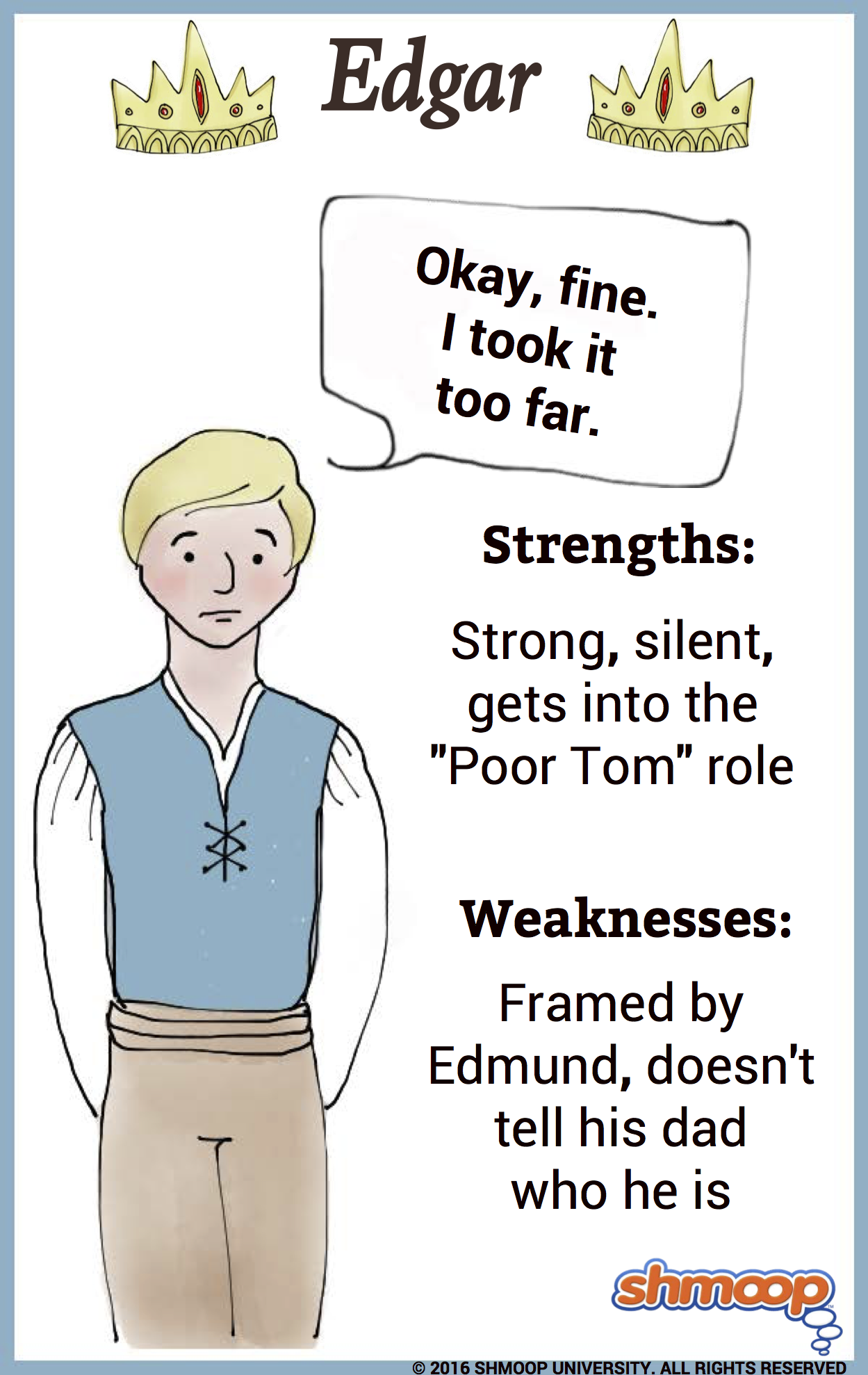Character Analysis

(Click the character infographic to download.)
Ed's (As Good As) Dead, Baby.
Edgar begins the play as the rich and clueless son of Gloucester, one of the kingdom's most powerful men. Edmund, Edgar's illegitimate brother, easily manipulates the trusting Edgar, and succeeds in getting Edgar falsely accused of plotting to kill their father. Now on the run from the law, Edgar decides that the only way to save himself is to disguise as a "Poor Tom," or "Tom O'Bedlam," a kind of crazy man that wanders around begging for food.
Unfairly convicted, Edgar has everything good in his life taken away. He's stripped of his identity and forced into the lowest possible social position. He ends up witnessing most of the horrible events of King Lear, and is always the guy to pull a "things can't possibly get any worse!" right before they do. Yet Edgar perseveres through hard work, determination, and a reliance on Shakespeare's carefully orchestrated coincidences. Of course, survival wouldn't be nearly so important if it didn't mean he got to take revenge at the end of it.
Edgar? There's No Edgar Here.
Which brings us to Edgar's darker side. Edgar gets way more into the role of "Poor Tom" than needed. Something about the craziness of this role clearly appeals to Edgar. Maybe that's not surprising, since Edgar has to deal with some pretty traumatic situations in his life. What's more disturbing is Edgar's choice not to tell his father who he is.
It would make sense for Edgar to be upset at his father. After all, his father assumes Edgar is guilty without ever going to his son and asking him about Edmund's accusations. Then his father makes Edgar a convict and forces him to run for his life. To make matters worse, Gloucester doesn't recognize his own son when he is disguised as Poor Tom. Instead, he tries to make the beggar go away (check out Act 3, Scene 4).
Despite all this, Edgar is kind to his father when Gloucester is blinded. He guides him, cares for him, and even kills a man who tries to capture his father. But Edgar doesn't tell Gloucester his identity. There's nothing stopping Edgar from saying, "Dad! It's me! Your long lost son!" But he doesn't. This is one of the most mysterious choices in the play. Even Edgar himself admits it was a bad call on his part. When telling his story later, he says he "never—O fault!—revealed myself" to Gloucester until right before Gloucester's death. Basically, that's Shakespeare for "my bad" (5.3.190).
Silent Sadist
Why doesn't Edgar tell his father who he really is? Gloucester has realized that Edgar was innocent, and he longs to be reunited with his son. "O dear son Edgar… Might I but live to see thee in my touch, / I'd say I had eyes again." Gloucester says in Edgar's presence (4.1.22; 24-25 ). Edgar hears this, but does not reveal himself. Some critics suggest that Edgar's refusal to tell his father his identity is Edgar's way of getting revenge on his father. Scholar Stanley Cavell argues that Edgar's silence is cruel. According to Cavell, by refusing to tell his father his identity, Edgar denies Gloucester the chance to "see him in his touch" and say he "had eyes again." By doing this, Cavell claims that Edgar symbolically blinds his father a second time.
Scholars also point out that there is something sadistic and mocking about Edgar's attempt to cure Gloucester's thoughts of suicide by having him believe he is jumping off of a cliff. Gloucester's suicide attempt is ridiculous, and it can seem as if Edgar is tormenting his father for his own pleasure.
On the other hand, it's worth noting that Gloucester does die of a combination of shock and joy when Edgar finally reveals his identity to his father. Edgar might have delayed telling his father the truth out of fear that something like this would happen.
Strong Silent Type?
There are also reasons that Edgar might not reveal himself to his father that have nothing to do with cruelty. Cavell, taking multiple sides as usual, suggests that Edgar's horror at his father's weakness made him silent. By revealing himself to his father, Edgar will have to watch his blind father realize that his son is now stronger and more capable than he is. Cavell suggests Edgar may be afraid of rubbing his strength in his father's face. "He wants his father still to be a father, powerful, so that he can still remain a child," Cavell writes.
Either way, Edgar is more than just a good guy who survives hard times and comes out on top. There's something strange about the way he claims that divine justice was responsible for the loss of Gloucester's eyes. "The gods are just and of our pleasant vices / make instruments to plague us," Edgar tells Edmund. "The dark and vicious place where thee he got / cost him his eyes" (5.3.206-207).
Edgar's argument is pretty extreme; he claims Gloucester's adultery, which produced Edmund, is a sin for which his father deserves a terrible punishment.
Edgar's Timeline